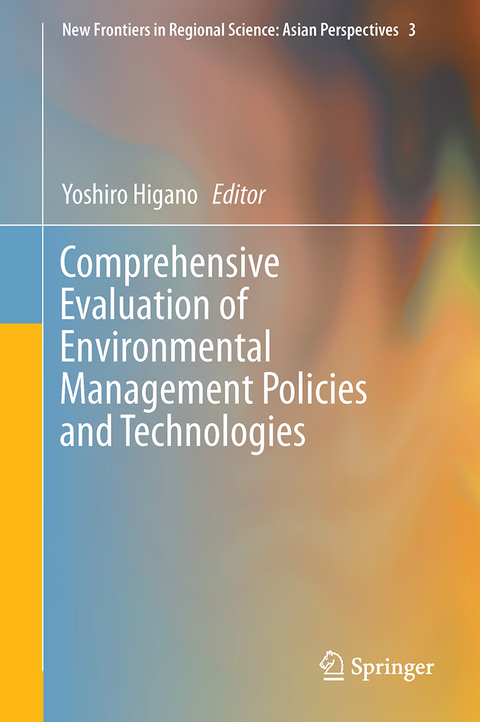
Comprehensive Evaluation of Environmental Management Policies and Technologies
Seiten
2025
|
1st ed. 2024
Springer Verlag, Japan
978-4-431-54821-8 (ISBN)
Springer Verlag, Japan
978-4-431-54821-8 (ISBN)
- Noch nicht erschienen - erscheint am 12.10.2025
- Versandkostenfrei innerhalb Deutschlands
- Auch auf Rechnung
- Verfügbarkeit in der Filiale vor Ort prüfen
- Artikel merken
This book integrates value balance, material balance and energy balance into the interaction model of socioeconomic activities and the environment, to provide a comprehensive environmental policy and technology evaluation method for planners and policy makers.
This book integrates value balance, material balance and energy balance into the interaction model of socioeconomic activities and the environment, providing a comprehensive environmental policy and technology evaluation method accessible for planners and decision makers who must determine the most effective environmental remediation technologies and policies. It provides the intellectual groundwork indispensable for understanding the importance of taking the three balances into account when the optimal set of technologies and policies is decided. It offers, as well, an ecological institutional framework for sustainable development and construction of a low-carbon society. The topics addressed in this book include, inter alia, social versus private value balances and the necessity of environmental policies in motion; the need for evaluation of environmental impacts on all environmental media based on material balance; the necessity of differentiation between fossil versus non-fossil energy sources based on energy balance and improvement of the trade-off between economic development and conservation of the environment with adoption of advanced environmental remediation technologies and policies. These topics are illustrated by applying a comprehensive evaluation method to urgent environmental issues such as sustainable development compatible with the Intergovernmental Panel on Climate Change (IPCC) scenario in developing countries, the ecological institutional framework after COP3, an inclusive watershed management focusing on sustainable development, wide-ranging waste management and construction of a circular-oriented society. The book is highly recommended to readers who seek a comprehensive policy evaluation method for environmental remediation technologies adaptable to complex issues.
This book integrates value balance, material balance and energy balance into the interaction model of socioeconomic activities and the environment, providing a comprehensive environmental policy and technology evaluation method accessible for planners and decision makers who must determine the most effective environmental remediation technologies and policies. It provides the intellectual groundwork indispensable for understanding the importance of taking the three balances into account when the optimal set of technologies and policies is decided. It offers, as well, an ecological institutional framework for sustainable development and construction of a low-carbon society. The topics addressed in this book include, inter alia, social versus private value balances and the necessity of environmental policies in motion; the need for evaluation of environmental impacts on all environmental media based on material balance; the necessity of differentiation between fossil versus non-fossil energy sources based on energy balance and improvement of the trade-off between economic development and conservation of the environment with adoption of advanced environmental remediation technologies and policies. These topics are illustrated by applying a comprehensive evaluation method to urgent environmental issues such as sustainable development compatible with the Intergovernmental Panel on Climate Change (IPCC) scenario in developing countries, the ecological institutional framework after COP3, an inclusive watershed management focusing on sustainable development, wide-ranging waste management and construction of a circular-oriented society. The book is highly recommended to readers who seek a comprehensive policy evaluation method for environmental remediation technologies adaptable to complex issues.
1. Introduction2. Three Balances3. Comprehensive Environmental Policy Evaluation Model4. Comprehensive Watershed Management of Closed Water5. Sustainable Development of China5.1 Construction of Resource Circular-Oriented Society5.2 Economic Development in China and IPCC Scenario5.3 Integrated Watershed management of Taihu Lake5.5 Comprehensive Evaluation of Sewerage Treatment and Reclaimed Water Technologies6. Comprehensive Environmental Remediation Technology and R&D Policy7. Conclusion
| Erscheint lt. Verlag | 13.4.2025 |
|---|---|
| Reihe/Serie | New Frontiers in Regional Science: Asian Perspectives ; 3 | New Frontiers in Regional Science: Asian Perspectives ; 3 |
| Zusatzinfo | 5 Illustrations, color; 65 Illustrations, black and white; X, 250 p. 70 illus., 5 illus. in color. |
| Verlagsort | Tokyo |
| Sprache | englisch |
| Maße | 155 x 235 mm |
| Themenwelt | Naturwissenschaften ► Biologie ► Ökologie / Naturschutz |
| Sozialwissenschaften ► Pädagogik ► Sozialpädagogik | |
| Sozialwissenschaften ► Politik / Verwaltung ► Staat / Verwaltung | |
| Wirtschaft ► Betriebswirtschaft / Management | |
| Wirtschaft ► Volkswirtschaftslehre ► Wirtschaftspolitik | |
| ISBN-10 | 4-431-54821-1 / 4431548211 |
| ISBN-13 | 978-4-431-54821-8 / 9784431548218 |
| Zustand | Neuware |
| Informationen gemäß Produktsicherheitsverordnung (GPSR) | |
| Haben Sie eine Frage zum Produkt? |
Mehr entdecken
aus dem Bereich
aus dem Bereich
Grundlagen, Systeme, Anwendung, Wirtschaft
Buch | Hardcover (2024)
Carl Hanser (Verlag)
99,99 €


